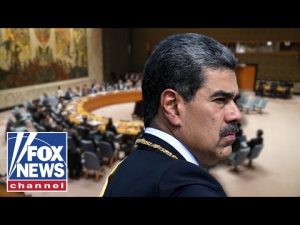In recent discussions surrounding national security, a serious concern has been raised about the state of the United States’ defense capabilities. The issue stems from what some call a glaring gap in leadership competence and the abdication of power by elected officials. As tensions grow with global adversaries, particularly regarding the advancements in hypersonic missile technology by Russia, many are left wondering why America seems less secure than ever.
Voter sentiment during the last election demonstrated a strong rejection of what some refer to as the “deep state.” However, there is a feeling that the same political elites who are supposed to protect the nation have instead turned a blind eye, allowing an unchecked bureaucracy to gain power. This has been likened to a game of hot potato, where the responsibility is continually shuffled without any real resolution. Instead of tackling the pressing threats of our time, these elected officials appear to be more concerned with maintaining their positions and appeasing certain bureaucratic figures.
Recently, an incident involving the acting Secret Service director has spotlighted this ongoing issue. During a questioning session, this unelected official seemed to lash out rather than offer substantive answers about his office’s management. His outburst, framed as a defense, revealed an alarming comfort in disregarding accountability, drawing comparisons to overly permissive parenting where consequences are non-existent. This evokes a sense of bewilderment for many, who expect leadership to maintain order and discipline, not just in homes but also in government.
The commentary suggests a fundamental misunderstanding of the roles within government. Elected officials should hold the position of authority, representing the will of the people, while unelected bureaucrats serve to implement those policies effectively. However, a disturbing trend shows the opposite, as career officials become emboldened and seemingly callous toward accountability, largely due to the complacency of the politicians who nominated them. This set-up begs the question: how did we get here, and what can be done about it?
It seems the path forward calls for a reawakening of civic engagement and responsibility among voters. Citizens must demand that their elected officials take back the reins of power from an overly expansive bureaucracy. Instead of allowing a “do-nothing” mentality to permeate, the focus should shift to efficiency and effectiveness in government operations. With the stakes higher than ever regarding national security, it is essential to restore a sense of order and accountability that aligns with the principles upon which this great nation was founded.
The overarching message is clear: America thrives only when its citizens actively engage in governance and hold their officials to account. In this era of rapid change and looming threats, the importance of a robust democratic process cannot be overstated. By reasserting control over elected officials, Americans can help ensure that the actions reflect the will of the people rather than succumbing to the whims of an unelected and unaccountable bureaucratic class. It’s a necessary step towards a safer, stronger nation.







